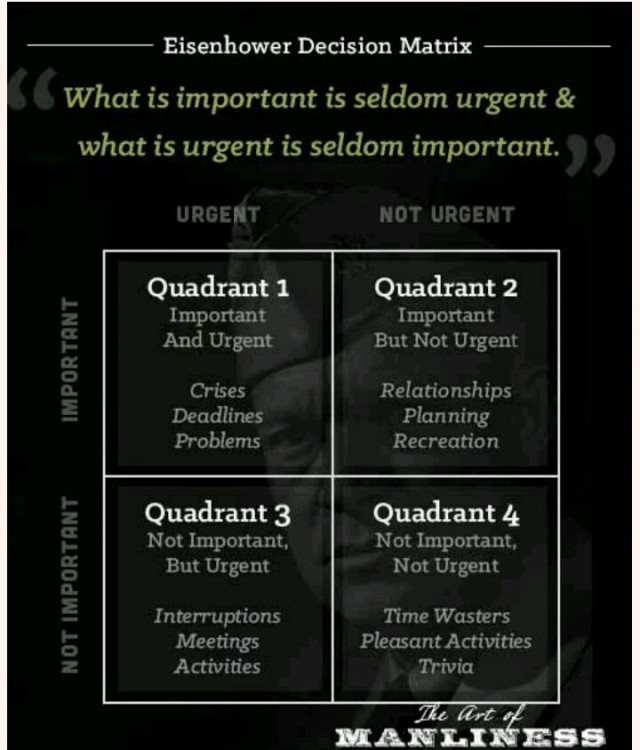Everybody on earth has an inelastic supply of twenty-four hours per day. Time is the only currency that we all have in equal proportion. The rich, the sick, the poor and the physically challenged all have the same amount of time. It is what we do with it that differentiates us.
I am no magician, I am not going to teach you incantations that will make you spend 30 hours per day or live for a thousand years. No one can do that, not even Methuselah.
So what am I going to do?
I am going to teach you simple nuggets that will help you become more productive, spend your time wisely and get great satisfaction from the tasks on which you exert your time and energy.
There are myriads of things to be done on any particular day. Many tasks are conflicting for your attention at the same time. The truth is that most of these tasks do not carry equal weight, some are more important than others while others are more urgent than the rest. There is a clear difference between surfing the internet and writing an examination.
The major task of a successful man is to race against the clock and get many things done within the span of the 24 hours that makes up a day.
But it isn’t just about getting things done.
It’s actually about getting the things that matters done. The important things. And the urgent issues resolved.
MAKE A TO DO LIST
[bctt tweet=”If you don’t want to agonize, you have to organize.”] Get a pen and a paper. Make a list of all you have to do in the day. Write down everything that comes to your mind. Enough of the excuse that you will remember the tasks when it matters.
I will rather you remember that even the best brains can forget. Your temperament shouldn’t be an excuse. With discipline, a sanguine can become excellently organized.
You will get more done on time if you actually have a sense of what you want to do. You will be able to exert mental energy and physical strength on clear-cut tasks. Jumping from one task to another without a sense of direction will be exasperating and unsatisfactory.
For a moment, imagine the tinge of fulfillment, when you cross off a task on your to-do list. It boosts your adrenaline and fire you up for the next task.
IMPORTANT vs URGENT
At this stage, you probably know some cool people who despite the fact that they usually go along with a long list of “To Do” or “Must Do” never seem to get anything done. Having a list is not a cure-all. You must move to the next stage of deciding your priorities.
There are so many tasks but with different priority level. The knowledge of effective classification of these tasks will mark the difference between your success and failure in spending more than 24 hours in a single day.
A key distinction must be made between important and urgent tasks. A task may be very important and yet not urgent while another task may actually be urgent, yet not important.
JOHN MAXWELL’S 3 R’S
John Maxwell enthused that in deciding priorities, you must pay attention to the 3R’s. These R’s are questions that must be sincerely answered in order for you to effectively arranged tasks in order of priority. They are:
What is REQUIRED?What gives the greatest RETURN?What brings the greatest REWARD?
You should pay close attention to tasks that are required of you that bring you the greatest reward and return. Some of the rewards and returns may be immediate, others may be futuristic.
PARETO PRINCIPLE
The Pareto Principle or the 80/20 rule is credited to an Italian economist Vilfredo Pareto who in 1906, created a mathematical formula to describe the unequal distribution of wealth in his country, observing that twenty percent of the people owned eighty percent of the wealth.
Applicably, this principle state that if you focus your energy on activities that in the 20th percent of importance to you, you will get an 80 percent return on your effort.
According to John Rey, a leadership and Management Expert;
“Pareto’s Principle, the 80/20 Rule, should serve as a daily reminder to focus 80 percent of your time and energy on the 20 percent of you work that is really important. Don’t just “work smart”, work smart on the right things.”
This classification shows that the ratio of the trivial to the vital can be as high as 80:20. Thus, if you will be more productive, you should focus your attention on the 20 vital things at the expense of the 80 trivial tasks because the 20 previous tasks will give you 80% of the reward and satisfaction that you require.
EISENHOWER’S DECISION MATRIX
President Dwight ‘Ike’ Eisenhower, the 34th President of the United States of America is reputed to have come up with a principle for effectively classifying priorities. This method was popularized by Stephen Covey in his book “The Seven Habits of Highly Successful People”. Take a look at the matrix below. I will explain each quadrant to you and the type of tasks that should be grouped there.

QUADRANT 1: IMPORTANT AND URGENT
These are tasks that must be executed with immediacy. They are also pivotal to your visions and mission in life. Most of these tasks have a deadline or an expiry date; that makes them urgent. They include medical emergencies, academic requirements with a time frame etc.
Since Q1 tasks often force you to leave every other thing you are doing, you should be mentally prepared to dispatch yourself once the bell tolls. If an important task requires a lot of effort, break it down into smaller tasks.
QUADRANT 2: IMPORTANT BUT NOT URGENT
This quadrant deals with activities that help you meet your lifetime goals, yet they don’t have a pressing deadline. Basically, they are fractional parts of a whole task that help you in becoming a better person.
They include tasks such as exercising, dating, studying, attending religious services, learning new things, planning for the future etc.
Though it is agreeable that you should dwell more on activities in this quadrant, as they’re the ones that provide lasting happiness, fulfillment, and success. Regrettably, we usually fail to do so because it’s either we have not actually discovered what is truly important to us (we roll with the crowd, controlled by moods and circumstances) or we simply lack the willpower and discipline to focus on important things.
Naturally, we divert our attention to the more pressing things because we cannot visualize the long-time reward of these important tasks. We keep postponing them until they become urgent, with deadlines. For example, if you don’t exercise regularly, you may have medical emergencies just as many students start preparing when exam timetables are out because they haven’t cultivated a regular study habit.
QUADRANT 3: URGENT BUT NOT IMPORTANT
Quadrant 3 tasks are activities that are mainly interruptions from friends and relatives. They are important to those who need the tasks, thus they put it across to you as urgent. When I was in the University, many folks approached me to explain some courses to them at their own convenient time. It is of great importance to them, so they make it urgent to me. In all honesty, they are interruptions on my programmes. A good leader is a great negotiator. I fix other times that will be convenient for us all.
Imagine if Mr. Femi needs one hour of your time in a day. You will grant him the 1PM – 2 PM appointment because you don’t want to appear selfish. He might have budgeted for that hour to fulfill his own priorities while you haven’t. It is an interruption, but not needless. Now imagine if 24 people should approach you and they ask to see you in a sequential order of 1PM – 2PM, 2PM – 3PM and so on. To each of them, it’s just one hour of their twenty-four hours, yet to you, it’s the whole of your day.
If you want to be more productive, know when to say NO and stick to it. You cannot please everybody, Mr. 9ice Alapomeji hasn’t succeeded in pleasing us all.
Examples of Quadrant 3 activities are phone calls, colleague or relative who comes by your desk during your prime working time to ask a favour, unplanned chores for parents etc.
According to Stephen Covey, many people spend most of their time on Q3 tasks, all the while thinking they’re working in Q1. Because Q3 tasks do help others out, they definitely feel important. Plus they’re also usually tangible tasks, the completion of which gives you that sense of satisfaction that comes from checking something off your list.
QUADRANT 4: NOT IMPORTANT AND NOT URGENT
This is simple and straightforward. Quadrant 4 activities aren’t urgent and aren’t important. Examples are watching TV, Mindlessly surfing the web (Scrolling through Facebook, Twitter, Instagram etc) Shopping (usually) etc.
We spend considerable part of our life on leisure activities in Q4, yet most of us do not make a single kobo from these social media platforms. Nonetheless, you don’t need to eliminate all Q4 activities, you only need to regulate them. Get a hold on your life, do something worthwhile and productive with your time. It is understandable that many people may want to cool off a hectic and busy day by randomly browsing the internet or watching a favourite TV show.
I know it takes time, discipline and focus to write out tasks and also classify them. It is not an easy task itself. I am also learning to do it. I am continually encouraged by E. M. Gray, who once said that
“Successful people do what unsuccessful people don’t like to do. Successful people have the habit of doing the things failures don’t like to do. They don’t like doing them either necessarily. But their disliking is subordinated to the strength of their purpose.”
DELEGATE TASKS
Knowing when to make apt decisions is the hallmark of leadership. One of the decisions that you should know when to make is that of delegating tasks to subordinates. In fact, technology has made things easier that you can even delegate tasks to virtual assistants.
Delegating tasks is not a sign of weakness but a necessary mechanism that saves you time and energy to concentrate on other pressing and important tasks. Don’t clutter your day with things that can be done better by another person. Start putting round pegs in round holes.
Have you heard of IFTTT? It’s a great social media app that synchronize your social accounts. It simply means If This Then That, it works on preset instructions and performs Action B provided action A, has been carried out. This can save you a lot of time. You can read further reviews here.
The simple secret to spending more than 24 hours in a day is to actually do the major tasks while freeing up time to do the lesser tasks.
At the end of the day, it is not the years in our life that matters but the life in our years. I have not been doing all the above before, but there is no better time to start but now. [bctt tweet=”William Penn once said “Time is what we want most, but what we use worst.””]
FEEDBACK:
Did I miss something? Do you think its necessary to prioritize? How has prioritization helped you? Do you know other time management techniques? Add your prioritization tip(s) in the comments box below. I will be delighted to hear from you.






